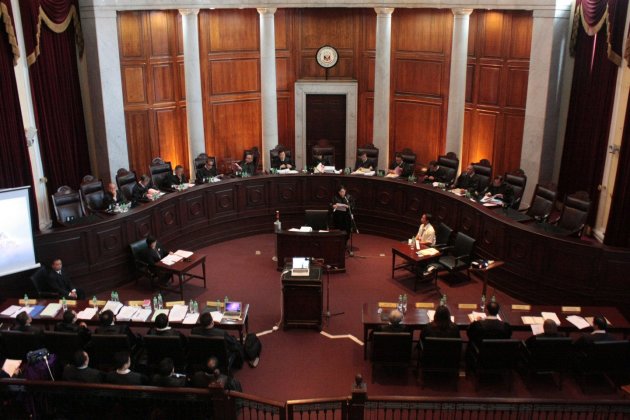
Amid protests outside the Supreme Court, the first ever oral argument to be led by Chief Justice Maria Lourdes Sereno on the controversial Cybercrime Prevention Act of 2012 started, with petitioners insisting the law violated the constitutional rights of the public.
The argument was opened by petitioner and Sen. Teofisto "TG" Guingona III who branded the law as a "Cyberdracula... with fangs that instill fear in the hearts of people."
As of posting, University of the Philippines law professor Harry Roque Jr, the first legal counsel designated to tackle issues on the law, is discussing arguments against Section 4(c)(4) on electronic libel.
In his presentation, Harry Roque criticized the law for its "overbreadth" and for being "overbroad."
Roque cited social networking site Twitter and Facebook, saying "the statute does not tell you who is responsible if you click on the like button."
In blogs, Roque said the Cybercrime Prevention Act does not specify "if the blog owner is liable for libel if the comment posted on the blog is liable."
Apart from Roque, others set to argue against the controversial law are:
-Rep. Neri Colmenares on Section 6, which punishes crimes by one degree higher than those crimes covered by the Revised Penal Code; and Section 7, which provides that a prosecution under the law shall be without prejudice to any liability under the RPC;-lawyer Rodel Cruz on Section 19, which empowers the Department of Justice to block computer data found to be in violation of the law;
-UP Law professor Jose Jesus Disini Jr. on Section 12, which empowers law enforcement authorities to collect traffic data in real time with specified communications transmitted through a computer system; and
-lawyer Julius Matibag on Section 5(1) and (b), which punishes an Internet user for aiding or abetting a cybercrime offense.
While oral arguments are ongoing, various groups, gathered some 200 meters away from the Supreme Court, conducted protests against the controversial law. —KG, GMA News
article from http://ph.news.yahoo.com/amid-protests-sc-starts-tackling-legality-cybercrime-law-070021202.html

0 comments:
Post a Comment